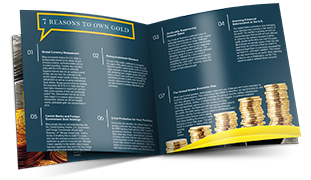 Gold’s reputation as a long-term asset means most investment advice focuses on buying, accumulating, and holding this yellow metal. This singular focus leaves many investors with a crucial and unanswered question: When is the best time to sell gold?
Gold’s reputation as a long-term asset means most investment advice focuses on buying, accumulating, and holding this yellow metal. This singular focus leaves many investors with a crucial and unanswered question: When is the best time to sell gold?
You may need to free up cash, capitalize on recent price fluctuations, or take an RMD from your precious metals IRA, knowing when to sell your gold is just as important as knowing when to buy. It’s essential for optimizing the return on your precious metals investments.
Sell too early, and you could miss out on crucial gains. Wait too long, and you might be forced to sell at an inopportune time.
Things to Consider Before Selling Gold
To accurately determine the best time to sell gold, investors must take a variety of personal and economic factors into account. Of course, the weight of each consideration will depend on your motivation for selling gold.
Price of Gold
Ideally, you should never sell gold for a loss. To make a profit, you must sell your gold when the value exceeds the price at which you bought it. One of the quickest ways to follow the value of gold is the spot price. This crucial number provides the basis upon which all physical gold assets are valued.
Another reason to track the price of gold is to make sure you’re not selling at a relatively low point. The value of gold fluctuates like any other asset, and selling during a dip can eat away at potential returns. The best time to sell gold is when the spot price is higher than your entry point and at a market peak.
Investment Goals
Investing isn’t a one-size-fits-all endeavor. Everyone has specific investment goals influenced by their unique time horizons, risk tolerance, and budget limitations. When it comes to financial goals, the best time to sell gold is when it aligns with a pre-planned investment strategy.
For example, if you need to free up cash immediately you might consider selling a portion of your gold quickly. Alternatively, if your objective is to build a nest egg or create generational wealth, it might be wise to have a measured approach by purchasing gold on a consistent basis to dollar cost average your overall investment.
👉 Suggested Read: Dollar Cost Averaging: What Is It & How It Maximizes Returns
Economic Climate
The broader economic climate should be factored into your decision because it impacts factors that regularly influence gold prices, including interest rates, investor behavior, and currency strength. Generally, gold prices increase when economic conditions worsen as retail investors, institutional investors, and central banks seek protection from inflationary pressure.
In terms of economic impact, the best time to sell gold is when circumstances are at their worst. This usually translates to higher demand for gold and, as a result, higher prices. By timing the sale during such peak demand periods, you can secure the most favorable returns on your investment.
Tax Implications
Before selling physical gold assets, you should understand the full weight of the incoming tax burden. The government takes a cut on profits from physical gold products, which are treated as collectibles. These taxes are realized after completing a sale.
If you’ve held the gold assets for over a year, the long-term capital gains tax is a staggering 28%. Gold assets sold within a year of purchase receive a varied short-term capital gains tax rate between 10% and 37%. Generally, higher returns mean a greater tax burden.
For investors holding a gold IRA, early withdrawals made before age 59½ may be subject to both income tax and a 10% early withdrawal penalty. When it comes to avoiding hefty tax rates and penalties, the best time to sell gold is during retirement when you have a required minimum distribution.
When You Might Want to Sell Gold
There are countless reasons to sell gold, yet most investors typically consider selling for a few common motivations:
You need cash quickly.
Maybe you overleveraged yourself by investing too much at once, or perhaps you suffered an unforeseen financial emergency. Regardless of the cause, there may be times when you need to convert your gold to cash quickly.
Fortunately, gold is a highly liquid asset, which means you can find a buyer and complete the transaction relatively quickly. Try to give yourself as much time as possible to find relatively beneficial market conditions and a reputable buyer. Be on guard for people looking to take advantage of desperate sellers.
The economy is recovering strongly.
Another time you might consider selling gold is during a recovering economy. Investors tend to allocate more wealth to physical gold assets when the market turns south to hedge against inflationary conditions.
As the economy shows signs of improvement, it may be strategic to reduce some of the gold holdings you built up during less stable times, potentially capitalizing on favorable market conditions. Keep in mind that economic recoveries are often unpredictable and volatile.
Your portfolio should be reallocated.
Physical gold is indispensable to a properly diversified portfolio. However, the precise amount of gold you hold might ebb and flow based on ever-changing market conditions, fluctuating geopolitical situations, and evolving financial objectives.
If you’re holding too much gold given how your investment strategy lines up with economic conditions, it could be wise to convert a certain amount of your gold holdings into another asset.

When is it the WRONG time to sell gold?
Knowing the best time to sell gold is only half the battle. There are a handful of scenarios when it’s not a good idea to sell gold. Avoiding these situations can leave your portfolio intact and your wealth secure.
When prices fall below purchase levels.
If possible, you should avoid selling when the price of gold falls below your original entry point. Selling at this point would mean realizing a loss on your investment.
After a sharp decline in prices.
As with any other asset, gold prices experience ups and downs. Try not to sell immediately following a sharp drop, as an equally steep jump could be around the corner.
Without a plan for the money.
Before selling your gold, you should have a clear plan for the funds. Simply holding it in cash leaves your wealth vulnerable to inflation.
Following an economic panic.
Fear is never a good foundation for investment decisions, especially when selling gold. Holding through the panic can prevent serious losses.
Is now a good time to sell gold?
With prices hovering at all-time highs, many investors are asking whether now is the right moment to sell. After all, with gold at these levels, most holders are sitting on substantial gains. However, there are two key reasons why selling now may not be the best move.
First, deteriorating macroeconomic conditions and rising geopolitical tensions suggest that demand for safe-haven assets is far from slowing down. In other words, this rally may still have room to run. In fact, a growing number of analysts are predicting gold could climb to $4,000 or even $5,000.
Second, gold is best viewed as a long-term store of value, not a short-term speculative play. Historically, its strongest performance comes from being held through periods of economic instability, not from attempts to time the market. Selling gold now may be premature when viewed through a broader investment lens.
Do NOT short-term this product. [Gold] is a long-term hold. That’s what it does best.–
Find The Best Time to Sell Gold For You
Understanding the true value of your gold assets, knowing when it’s the best time to sell gold, and determining whether selling aligns with your financial goals are crucial steps in managing your investments effectively.
For personalized guidance tailored to your unique financial situation, consider reaching out to a precious metals advisor at Scottsdale Bullion & Coin. They can provide expert input and help you make informed decisions based on your specific investment circumstances. Contact us today by toll-free at 1-888-812-9892 or using our live chat function.


